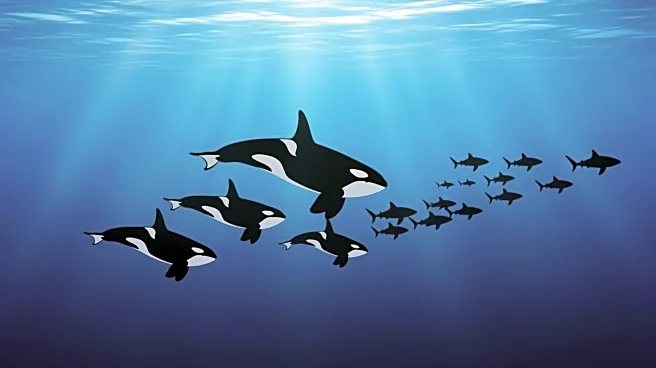What's Happening?
Researchers have documented orcas hunting juvenile great white sharks in the Gulf of California, marking the first recorded instance of such behavior in Mexican waters and only the second globally. The orcas employ a technique known as tonic immobility,
flipping the sharks belly up to paralyze them before extracting and consuming their nutrient-rich livers. This behavior highlights the orcas' advanced intelligence and strategic hunting methods, which are passed down through generations within their pods. The presence of juvenile sharks in the Gulf may be linked to warmer waters altering the distribution of white shark nurseries, making them more vulnerable to predation by killer whales.
Why It's Important?
The predation of juvenile great white sharks by orcas could have significant implications for the white shark population in the region. Juvenile sharks, lacking developed anti-predator mechanisms, are more susceptible to orca attacks compared to adults, who can vacate their hunting grounds when orcas appear. This vulnerability could lead to a decline in the white shark population if the trend continues, potentially disrupting the marine ecosystem. The study underscores the impact of climate cycles, such as El Niño, on marine life distribution and predator-prey dynamics, highlighting the broader ecological consequences of environmental changes.
What's Next?
Further research is needed to understand the long-term effects of orca predation on the white shark population in the Gulf of California. Scientists may investigate whether the trend will continue and how it might affect the broader marine ecosystem. Conservationists and marine biologists could explore strategies to protect vulnerable shark populations, possibly by monitoring nursery areas and studying the impact of climate change on marine species distribution. The findings may also prompt discussions on the need for international cooperation in marine conservation efforts.
Beyond the Headlines
The study of orcas hunting juvenile great white sharks sheds light on the complex social structures and learning behaviors of killer whales. It also raises questions about the ethical considerations of human intervention in natural predator-prey relationships. As climate change continues to alter marine environments, understanding these dynamics becomes crucial for developing effective conservation strategies. The research highlights the importance of preserving biodiversity and maintaining ecological balance in the face of environmental changes.















